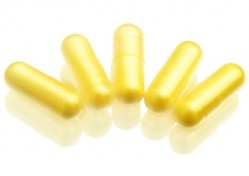Are vitamin D levels linked to body weight?

According to a new paper in the European Journal of Clinical Nutrition, fat cells (adipocytes) can express the receptor for vitamin D, suggesting that vitamin D may play a role in regulating the function of fat tissue.
However, it is still unclear if obesity is responsible for low vitamin D levels, or if vitamin D deficiency can lead to obesity. The new data suggests that vitamin D levels may influence the incidence of obesity.
“The results of the present study suggest that lower 25-hydroxyvitamin D values in obese subjects may not have been secondary to obesity, but may in fact precede obesity,” wrote researchers from Hospital Regional Universitario Carlos Haya de Málaga and Ciber de Diabetes y Metabolismo in Barcelona.
The sunshine vitamin
Vitamin D refers to two biologically inactive precursors - D3, also known as cholecalciferol, and D2, also known as ergocalciferol.
Both D3 and D2 precursors are transformed in the liver and kidneys into 25- hydroxyvitamin D (25(OH)D), the non-active 'storage' form, and 1,25-dihydroxyvitamin D (1,25(OH)2D), the biologically active form that is tightly controlled by the body.
Vitamin D deficiency, which is defined as a status of less than 20 nanograms per milliliter (ng/mL) of 25-(OH)D, can cause a number of health issues, including rickets and other musculoskeletal diseases.
Recently, however, data suggests that vitamin D deficiency (<20 ng/mL) and vitamin D insufficiency (between 21-29 ng/mL) may be linked to cancer, autoimmune diseases, infectious diseases, type 2 diabetes and cardiovascular disease.
The new study suggests a role for vitamin D in obesity.
Study details
The Spanish researchers collected data from 1,226 people at three different visits (first visit was 1996-1998, second visit was between 2002 and 2004, and third and final visit was between 2005 and 2007).
Results showed that for the 1st, 2nd, and 3rd visits, the prevalence of obesity was 28.1, 36.2 and 39.5%, respectively. Just fewer than 35% of the people were vitamin D deficient.
While no link between vitamin D level and being obese at the start of the study was observed, the data indicated that non-obese people with vitamin D deficiency at the time of the second visit had a significantly increased risk of developing obesity in the next four years
“The relationship between obesity and vitamin D still remains unclear,” said the researchers. “It may have a multifactorial etiology, involving such factors as inadequate sun exposure, less exercise in obese subjects due to reduced mobility, suboptimal intake of vitamin D, increased storage of vitamin D in adipose tissue, an increased activity of the 24 hydroxylase enzyme in adipose tissue that promotes vitamin D catabolism, or a decreased production of 25-hydroxyvitamin D in the liver due to hepatic steatosis.”
Source: European Journal of Clinical Nutrition
Volume 67, Pages 680–682; doi:10.1038/ejcn.2013.48
“Hypovitaminosis D and incidence of obesity: a prospective study”
Authors: I González-Molero, G Rojo-Martinez, S Morcillo, et al.
















